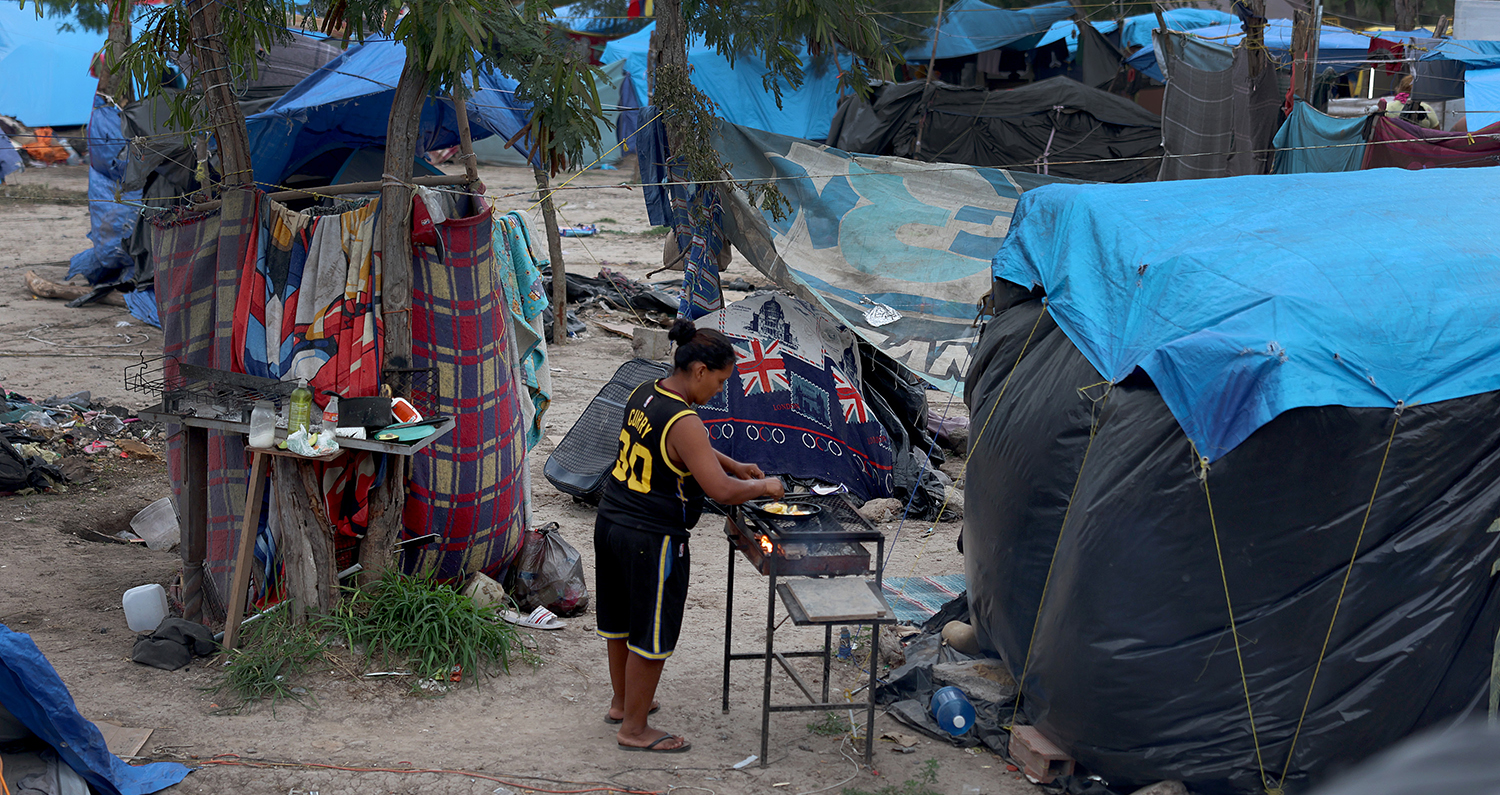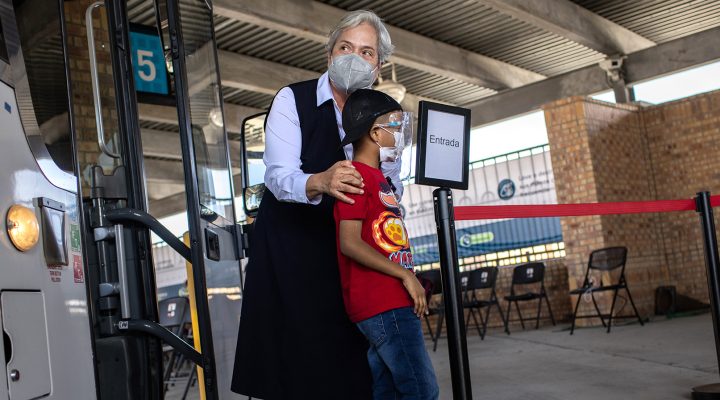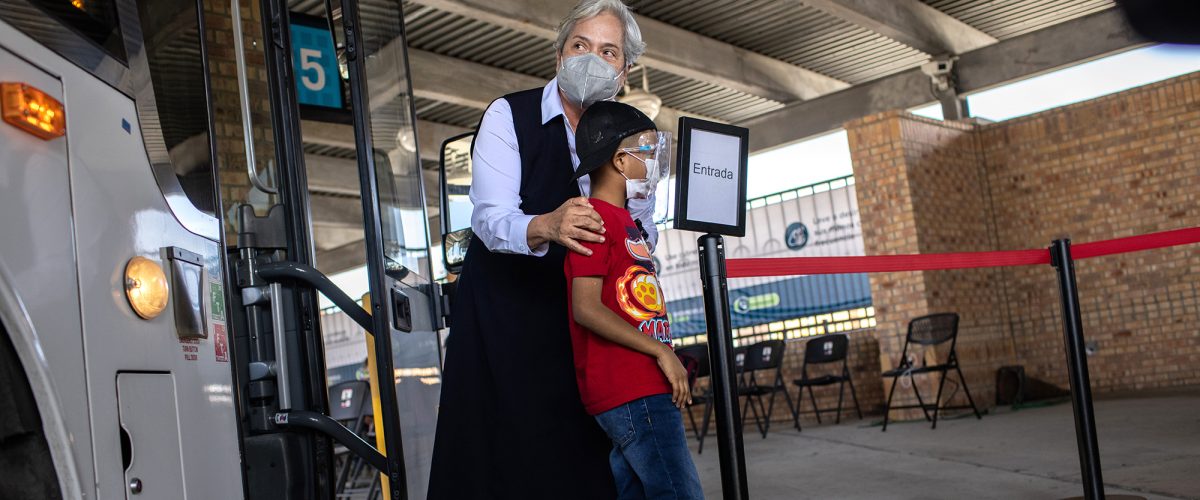Christians must stand up and stand for some of the world’s most vulnerable people — refugees at the United States’ southern border — Sister Norma Pimentel told participants at the Cooperative Baptist Fellowship’s Encourager Church and Advocacy breakfast June 30 in Atlanta.
Pimentel serves as executive director of Catholic Charities of the Rio Grande Valley and is a nun belonging to the Missionaries of Jesus order. She is a renowned leader in ministry to and advocacy for immigrants from all over the world who seek asylum in the United States.
Born in Brownsville, Texas, as the child of Mexican immigrant parents, Pimentel has spent her adult life ministering on the eastern edge of the border between the two countries, near the Gulf of Mexico.
Multitudes of refugees have passed through the area for decades, she said, noting their bishop asked the sisters of their order to operate a house or shelter for refugees during the civil war in El Salvador.
“At night, I would hear stories of how they were tortured back home,” she recalled, adding, for example, she met a man with no fingernails because they had been pulled out.
During the Salvadoran civil war, the United States was spending $1 million per day to buy arms to support the war, she said. The sisters had been asked to advocate on behalf of the refugees, and she and another nun attended a protest. Organizers planned to practice civil disobedience in order to influence a congressman in the region.
The manager of the building where the protest took place called the police. An older nun reminded her if they truly believe in something, they must act. But because of their responsibilities for the order, she said, “You know, Norma, … we can’t both get arrested,” Pimentel recalled. “She was twice my age. So, I said, ‘I guess it’s me, right?’ And she said, ‘Bye.’ …
“That became a defining moment for who I am. I said yes.”
“That became a defining moment for who I am. I said yes. I’m not the one who goes looking for trouble, but if trouble finds me, I stand up. … We must stand up and speak for life. We must not only be a voice for those who have no voice. We must help them have a voice.”
Pimentel has devoted her life to giving voice to the voiceless. During her introduction, CBF missionary Elket Rodríguez, who lives near Pimentel on the border, mentioned a litany of her awards and honors. Fortune magazine included her in its list of the World’s 50 Greatest Leaders, and Time magazine named her one of the 100 most influential people in 2020. She was the Rio Grande Valley’s Citizen of the Year in 2015.
A self-effacing person, Pimentel stressed the awards are valuable because they provide a platform for people whose lives are in peril.
‘Listen with compassion’
A key to ministry to — and advocacy for — migrants is listening to them with empathy and compassion, she said.
“Ask, ‘Como estas? How are you?’” she advised, noting most often, nobody has ever asked them that simple question, because they have not met someone who cared to ask.
She recounted looking across a parish hall filled with immigrant families and spotting a pregnant mother.
“‘When are you due?’ I asked her. ‘Now,’ she said,” Pimentel reported. “Why would she come to the border? People died all along the way because of exhaustion and heat. And here was this young, petite pregnant mother with a girl 3 years old. Why would she come?
“She showed me her hand, which was disfigured. Someone entered her house and struck a machete at her daughter, and she lifted her hand to protect her child. … She told me, ‘If I had stayed home, we would not be alive today.’”
“So many stories” echo that young mother’s tale, Pimentel said.
What the Bible says
And still, so many Christians say immigrants should not come to America “as if it’s OK to turn your back on them,” she said.
A pastor told her members of his congregation don’t believe they should help immigrants. Another asked why she was “trafficking” people into the United States.
“The Bible I read is a Bible of love. It is very clear: We are to love our brothers and sisters,” she insisted. “What anyone from the church and I do is what the Bible tells us to do in Matthew 25,” where Jesus said his followers feed, give water to and welcome him when they feed the hungry, give water to the thirsty and welcome the stranger.

A migrant cooks dinner in a temporary encampment on the banks of the Rio Grande as asylum-seekers wait for permission to enter the United States on May 12, 2023, in Matamoros, Mexico. (Photo by Joe Raedle/Getty Images)
Failed U.S. policies
However, the United States administrations — every single one of them — has come up with policies to deter immigrants from seeking asylum, she said.
The previous administration implemented “the harshest” deterrent by separating families, she added. “They said, ‘We will take your children away,’” and some families still have not been reunited.
Pimentel has witnessed many children and parents coming back together at the reunification center Catholic Charities operates just north of the border.
“I saw a little girl hanging onto her mother. The child said, ‘Tonight, I will not cry.’”
“I saw a little girl hanging onto her mother,” she noted. “The child said, ‘Tonight, I will not cry.’ She had cried every night she had been separated from her mother.
“It is amazing what our country has done to so many children. And we are part of it because we are the United States.”
The previous administration implemented what was known as the “Remain in Mexico” immigration policy, she said. It required asylum seekers to stay in Mexico while awaiting opportunity to file asylum papers and then while those applications were being processed. Thousands of immigrants — most of them families with children — crowded the border.
“How terrible it was,” Pimentel remembered. A mother sent a picture from inside the family’s pup tent, and the walls were so covered with mosquitoes they looked black. Rats chewed through tent walls and nibbled on children’s ears. Snakes crawled into the tents, and icicles formed inside the tents in winter.
When the current administration began allowing immigrants — except those who fail a criminal background check or test positive for COVID — to await the asylum process in the United States, “it was like the parting of the Red Sea,” she said, describing how immigration officers welcomed them.
‘God hears the cries’
“I know it was God who heard the cry of his people and opened the doors — and his people came in,” she said.
Still, “thousands and thousands” of immigrants are living in shelters and on the streets of Matamoros, across the border from Brownsville, and Reynosa, across the border from McAllen, Texas, she said. While the asylum application process has been moved onto an app and somewhat streamlined, it’s still slow and difficult.
“They have to wait in Mexico in conditions that are very difficult,” she said.
But glimpses of humanity occasionally shine through. She told about meeting a young father who was in “bad condition” — physically exhausted, dirty, and in tattered clothing except for new sneakers.
“I asked him where he got that nice pair of tennis shoes,” she explained. He told her an immigration officer noticed he was barefoot, and his feet were badly damaged. The officer asked why, and the father explained he lost his shoes and walked barefoot across the desert. The officer told him to stay put. The officer went to his car and brought back his own new sneakers. He took off his work shoes, removed his socks, put them on the father’s feet and gave the man his sneakers.
“The refugees at the border are just like you and me.”
That is hospitality to strangers, Pimentel said. “This is what we must do.”
“The refugees at the border are just like you and me,” Pimentel said. “Go see them. Your heart will tell you what to do.”
Stephen Reeves, executive director of Fellowship Southwest and CBF’s outgoing director of advocacy, echoed Pimentel. “Come to the border; see for yourself,” he said.
To find out more about mission opportunities on the border, contact Reeves or contact Ellen Sechrest, CBF’s director of global missions church engagement.
Related articles:
Practicing advocacy from the pulpit can be a ‘fiery furnace’ experience, panelists tell CBF
Advocacy’s power flows from grassroots movements, Tyler and Henderson tell CBF
Advocacy involves a range of issues, shares a core faith, CBF panelists say


